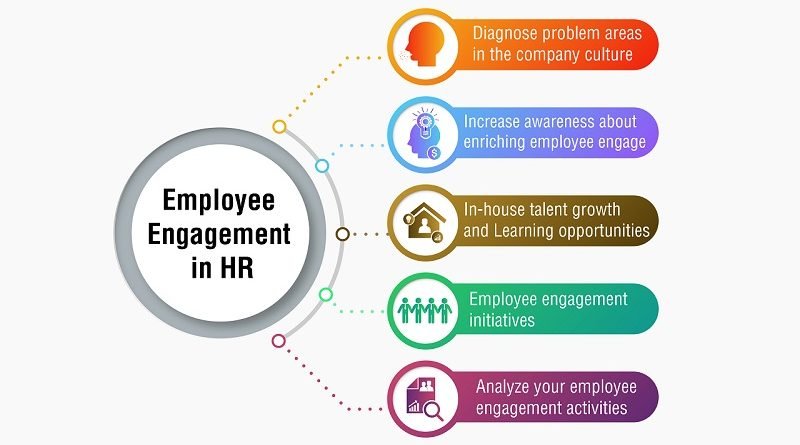Nurturing a Productive Workforce: The Importance of Employee Engagement
Every organization is akin to a well-oiled machine, with employees serving as its core components. Just as a machine requires regular maintenance for optimal performance, employees need continuous engagement for enhanced productivity and morale. Understanding and implementing effective employee engagement strategies can significantly contribute to fostering a happy, motivated, and high-performing workforce.
Understanding Employee Engagement:
Employee engagement refers to the strategies aimed at bolstering an employee’s commitment towards their job, team, and the organizational culture. Typically orchestrated by the Human Resources (HR) department, these strategies are instrumental in creating an environment that stimulates productivity and job satisfaction.
A truly engaged employee exhibits a level of dedication that extends beyond their primary responsibilities, thereby contributing to the organization’s growth. In this endeavor, HR software can prove invaluable, enabling HR managers to design and implement effective employee engagement initiatives.
Addressing Cultural Challenges:
The HR team, given their overarching perspective of the organization’s work processes and culture, plays a pivotal role in identifying and addressing issues within the company. Anonymous feedback systems are often employed to gain genuine insights into employees’ concerns without any fear of retribution.
Moreover, adopting a closed-door feedback policy can encourage positive criticism, leading to constructive changes without adversely affecting employees’ morale. Thus, by diagnosing problem areas and proposing suitable solutions, the HR team can create a harmonious and efficient work environment.
Promoting Employee Engagement Awareness:
Organizational leaders and the HR department bear the responsibility of nurturing a satisfied workforce. By actively promoting employee engagement, organizations can retain their talent pool more effectively. However, it’s a two-way street – employees too must partake in engagement initiatives to achieve desired results.
Hence, the HR team must stay abreast of contemporary trends and methods that enhance employee engagement, thereby ensuring their efforts don’t go in vain.
Fostering In-House Talent and Learning Opportunities:
Routine job profiles can often lead to monotony, increasing employee turnover rates. To counter this, organizations should prioritize providing ample learning opportunities and focus on nurturing their in-house talent.
Employees should be encouraged to learn new skills and aspire for career growth. Leaders should recognize and hone the potential within their teams, creating future leaders. Utilizing HR software to organize learning modules can be a fruitful approach towards in-house talent development.
Moreover, leaders should aim to:
- Appreciate top performers and acknowledge their efforts.
- Foster stronger team bonding.
- Practice empathy towards their team members.
- Be receptive to ideas and suggestions from their team.
- Identify underperformers and devise an action plan to aid their improvement.
Enriching Employee Engagement Initiatives:
Employee engagement is strongly tied to an individual’s sense of belonging within the organization. When employees feel valued and included, their productivity naturally surges. Here are a few strategies to boost engagement and productivity:
Rewards and Recognition:
Recognizing employees’ efforts is vital. Even a simple expression of gratitude can significantly boost morale. Publicly acknowledging employees’ hard work during team meetings can also enhance their sense of appreciation and recognition.
Rewards serve as powerful motivators. Incentives such as gift cards, paid vacations, and other bonuses can motivate employees to continually perform well. Regularly conducted rewards and recognition programs offer substantial returns on investment.
Ice-breaking and Team Building Sessions:
These sessions promote a sense of unity within the team, especially making newcomers feel welcome. Effective team coordination is key to enhancing productivity and reducing attrition rates.
Employee Engagement Activities:
The following activities can enrich employees’ experience:
- Recognize and reward the “Employee of the Month”.
- Introduce “Fun Friday” activities.
- Regularly organize potlucks and team dinners.
- Celebrate team members’ birthdays and milestones.
- Conduct sessions on work-life balance.
- Plan team outings and celebrate all festivals.
- Introduce “Bring your family and pets to work” days.
- Organize brainstorming sessions.
Assessing Employee Engagement Activities:
It’s crucial for organizations to regularly evaluate their employee engagement activities. Determining the return on investment from these initiatives and gathering employee feedback on potential improvements can help fine-tune the strategies.
In Conclusion:
Monitoring and measuring the effectiveness of employee engagement should be a key element of any organization’s HR management. Such initiatives help cultivate a harmonious workspace, retain employees, enhance productivity, and reduce absenteeism. Prioritizing employee engagement not only creates a content workforce but also paves the way for organizational success.




